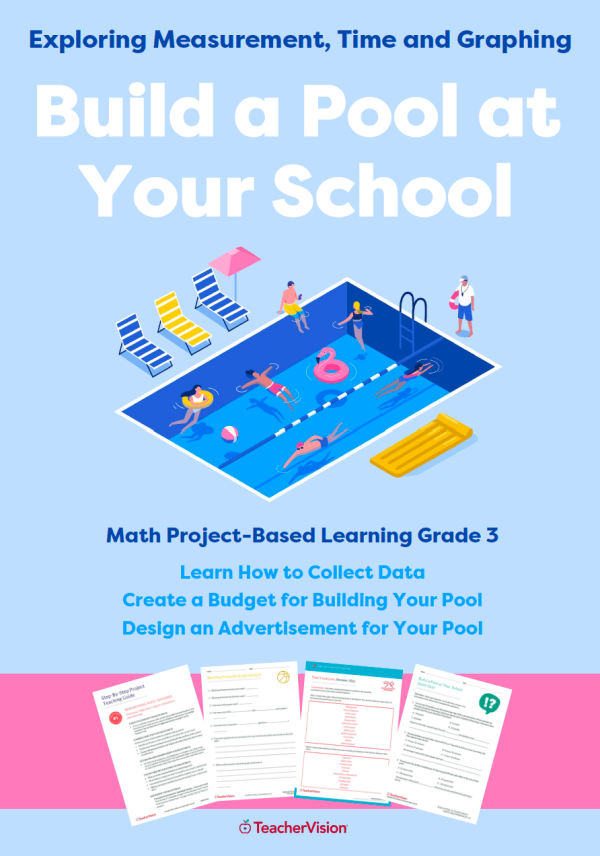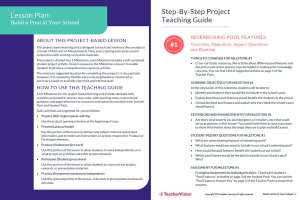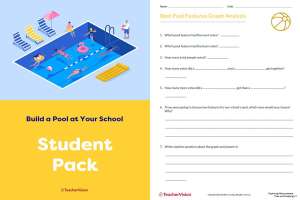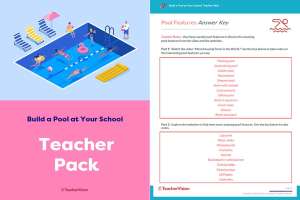
A Complete CCSS-Aligned 3rd Grade Measurement and Data Lesson Plan with Project-Based Activities
Build background knowledge on measurement, time, graphing, pool building, and planning, then construct a model of a custom pool design!
This project-based learning unit is designed to teach and reinforce the concepts in a Grade 3 Math unit on Measurement, Time, and Graphing and can be used in conjunction with existing curriculum materials. Students will research pool building, conduct market research, and collect and analyze data to determine the best approach for their pool design. They will then plan the pool construction process, create timelines, calculate accurate measurements and costings, and create a 3D model using modeling software.
How to Use the Lesson Plan
The project is divided into 5 Milestones; each Milestone includes a self-contained student project activity. Done in sequence, the Milestones connect to enable students to produce a comprehensive capstone activity. The minimum suggested duration for completing this project is 5 class periods. However, it is completely flexible and can be lengthened or shortened as necessary, based on available class time and interest level.
What's Inside
Packed with hands-on activities that explore units of measurement, data collection, and time concepts. The lesson plan includes ideas for extensions and enhancements, cross-curricular independent and group work, and engaging and interactive challenges. This 53-page project-based unit comes complete with:
- For the Teacher: A complete lesson plan aligned with common core standards, which includes step-by-step instructions for all activities, teaching tips, assessment guidance, and inquiry questions.
- For Students: A full-color student pack complete with all of the worksheets, printables, and instructions students need for the research and hands-on activities - just print (or share) and teach!
A complete, ready-to-teach Teacher Pack that includes:
- Teacher versions of all the student worksheets and printables with step-by-step instructions;
- Formative and summative assessments, answer keys and a full project rubric;
- Instructions and guidance for the extension activities and project enhancements;
- Materials and resources lists, links to articles and additional resources for lecture and presentation.
What's Included
Lesson Plan - Step-by-Step Project Teaching Guide
- Milestone #1 - Researching Pool Features
- Milestone #2 - Conducting Market Research
- Milestone #3 - Creating a Plan for the Pool
- Milestone #4 - Creating a 3D Pool Model
- Milestone #5 - Presenting Pool Designs
Teacher Resources
- Materials List - Materials Needed for the Projects in This Unit
- Articles About Pool Features and Construction
- Pool Features Answer Key
- Best Class Pets Data Collection
- Best Class Pets Graph
- Best Class Pets Graph Analysis
- Steps to Build a Pool Answer Key
- Pool Building Timeline Answer Key
- Build a Pool at Your School Quick Quiz
- Build a Pool at Your School Quick Quiz Answer Key
- Build a Pool at Your School Summative Assessment
- Build a Pool at Your School Summative Assessment Answer Key
- Build a Pool at Your School Project Rubric
Student Resources
- Pool Features
- Build a Pool at Your School Project Guidelines
- Top 5 Pool Features
- Milestone #1 Inquiry Question
- Best Pool Features Data Collection
- Best Pool Features Graph
- Best Pool Features Graph Analysis
- Milestone #2 Inquiry Question
- Steps to Build a Pool
- Pool Building Timeline
- Pool Blueprint
- Pool Calculations
- Milestone #3 Inquiry Question
- Pool Budget
- Tips for Making an Advertisement
- Milestone #4 Inquiry Question
- Amazing Pool Features
- Milestone #5 Inquiry Question



OVERVIEW:
This project-based learning lesson is designed to support and reinforce the concepts in a Grade 3 math unit on Measurement. It is built around 5 inquiry-based milestones that incorporate cross-curricular hands-on projects, formative and summative assessments, independent and group activities, and extensions.
STUDENT/GROUP OUTPUT:
In the course of this project-based learning unit, students will:
- Build background knowledge about measurement, time, graphing and pool building
- Conduct market research, collect, display and analyze data
- Plan and build a pool model using accurate measurements
- Calculate costs for their pool design
- Design an advertisement for their chosen pool design
SUGGESTED SUBJECT PREREQUISITES:
Students will acquire the necessary background knowledge of measurement, time, graphing and swimming pools, as part of this project, and instructional materials for providing that background are included in the Teacher Pack.
SEQUENCE AND PACING:
This project-based unit is divided into 5 milestones. The minimum suggested duration for completing this project-based unit is 5 class periods. However, the unit is completely flexible and can be lengthened or shortened as necessary or desired, based on available class time and interest level.
SUGGESTED TECHNOLOGY RESOURCES:
Internet access
STANDARDS ALIGNMENT
These activities support the following CCSS curriculum standards:
- CCSS.MATH.CONTENT.3.MD.A.1 - Tell and write time to the nearest minute and measure time intervals in minutes. Solve word problems involving addition and subtraction of time intervals in minutes, e.g., by representing the problem on a number line diagram.
- CCSS.MATH.CONTENT.3.MD.A.2 - Measure and estimate liquid volumes and masses of objects using standard units of grams (g), kilograms (kg), and liters (l). Add, subtract, multiply, or divide to solve one-step word problems involving masses or volumes that are given in the same units, e.g., by using drawings (such as a beaker with a measurement scale) to
- represent the problem.
- CCSS.MATH.CONTENT.3.MD.B.3 - Draw a scaled picture graph and a scaled bar graph to represent a data set with several categories. Solve one- and two-step "how many more" and "how many less" problems using information presented in scaled bar graphs. For example, draw a bar graph in which each square in the bar graph might represent 5 pets.
- CCSS.MATH.CONTENT.3.MD.B.4 - Generate measurement data by measuring lengths using rulers marked with halves and fourths of an inch. Show the data by making a line plot, where the horizontal scale is marked off in appropriate units— whole numbers, halves, or quarters.




